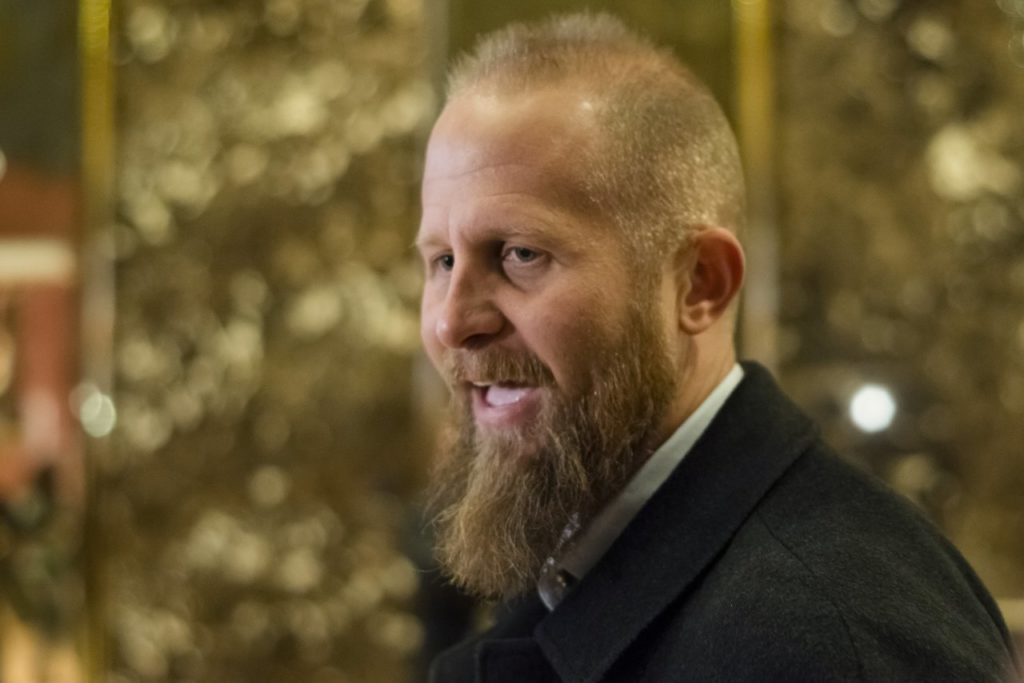Editor’s NOTE: This ran in the newspaper in November. Just found out Parscale resigned from the board of the company in Mid-December.
The highest-profile tech entrepreneur to emerge from San Antonio over the past decade is Brad Parscale. His career rocketed upward over the last four years, from designing a $1,500 Trump campaign website in 2015, to digital director and largest-billing vender to the successful “Project Alamo” in support of the 2016 Donald Trump Presidential campaign, to his current appointment, beginning in February 2018, as campaign manager for Trump’s 2020.

Although he lives in Florida now, Parscale continues to have ongoing deep ties to an obscure but publicly traded web, design and data-based business in San Antonio. This business, under the umbrella Cloud Commerce (ticker CLWD) is one of the mysteries of the Brad Parscale story. Parscale currently serves on the Board of Directors of CLWD.
The mystery began with the announcement, August 1, 2017, of the sale of Parscale’s web design business to Cloud Commerce, for a reported $10 million. That transaction never make sense, from a straightforward financial perspective, more than two years ago.
Cloud Commerce has never traded on a major exchange and it has long existed in a different, murkier, world from regular stocks. With 137.5 million shares outstanding, “trading” at a price between 0.0027 and 0.02 in the past year, the value of the company could be mathematically described as between $370 thousand and 2.7 million. In the week before Parscale sold his company in 2017, all shares in CLWD were “traded” at $0.01, for a total company “worth” of $1.37 million.
But trading volume on the shares typically reaches to less than $1,000 per day, which means that a true market value of the company is nearly impossible to determine.
On Penny Stocks
It’s worth considering the strange world of penny stocks it comes from.
A “penny stock” is any publicly owned company whose shares trade below $5 a share. Any stock trading below $2 in the case of the Nasdaq – or $1 in the case of the New York Stock Exchange – risks losing their listing on a major stock exchange. But CLWD shares have long traded at one one-hundredth of the penny stock threshold and has never come close to being eligible for listing on an exchange.

Cloud Commerce has lost money every year since current management took over in 2012. Losses totaled less than $1 million in 2012, 2013 and 2014, but have since accelerated to at least $2 million per year, and an average of over $4 million, since 2016. Having lost money every year, the company has never paid federal taxes.
Penny stocks like this don’t really make sense as investments but are often vehicles for “pump-and-dump” schemes, in which operators hype thinly-traded shares to attract buyers, and then sell shares at the inflated prices.
Robert R. Johnson, Professor of Finance, Heider College of Business, Creighton University points out, “for the vast majority of investors, investing in penny stocks is wholly unsuitable. Penny stocks are the Wild West of the financial landscape. Investors should simply expect to lose their investment in penny stocks. There is an immense amount of fraud in the penny stock world.”
The Cloud Commerce story does not seem to be an exception to this rule of penny stocks. it’s a loss-making firm with strange financial arrangements. As Jacob Frenkel, former SEC regulator said in an Associated Press story regarding Cloud Commerce: “What about this company isn’t a red flag?”
Financing The Sale, Without Any Money
The strangeness of Parscale’s sale to a penny stock company began with the announcement that Parscale and his San Antonio-based partner Jill Giles had sold their business for $10 million to Cloud Commerce.
Strange, because the value of the acquiring company Cloud Commerce at the time, as measured by “market capitalization,” was less $1.5 million.
So how could Cloud Commerce pay $10 million when they lose money every year and were only supposedly worth $1.5 million?
The quick answer: It didn’t pay $10 million.
Instead, the purchase was structured in the following way.
Public filings describe Parscale received 90,000 “Series D Preferred shares,” each convertible into 2,500 common shares in Cloud Commerce. The 90,000 Preferred shares granted Parscale the right convert into 225 million common shares of Cloud Commerce. In other words, more shares than were currently outstanding in the company. If he converted his preferred shares and other executives did not, he would become the majority shareholder in the company, with 225 million shares. Parscale was locked up for two years from selling, or in other words until August 2019.
Parscale seems to have been excited about the possibilities of owning shares in his penny stock firm in the days following the sale, with a tweet on August 8, 2017 touting the stock’s rise from 0.01 to 0.05. He tweeted “Big week for the parent company of my commercial business @CloudCommerceco. Stock up 500%”
Big week for the parent company of my commercial business @cloudcommerceco. Stock up 500%. https://t.co/u1Pbfi0HmO
— Brad Parscale – Text TRUMP to 88022 (@parscale) August 8, 2017
In the announcement of the sale to Cloud Commerce, these 90,000 “Series D Preferreds” were declared to be worth $9 million.
How? Just because. It’s as real as if I wrote down the number $9 million on a piece of paper, then handed it to you. “Here,” I’d say conspiratorially, sliding it across the table, “I’m giving you $9 million. Trust me. See? It says $9 million right here on the paper.”
It is true that had the shares remained at $0.04 or above, Parscale could have, sort of, claimed his stake was theoretically worth $9 million, two years hence. For the past year the shares have rarely broken 0.02 and are today “worth” one-tenth of even that amount.
The $10 million announcement in August 2017 also mentioned an extra payment of $1 million in cash to be paid to Parscale. Except that CloudCommerce doesn’t have that kind of money.
So, six months later, when it still had not paid Parscale any cash, it began to make arrangements. According to a February 2018 8K filing, the company made an agreement with Parscale to pay $1 million in the form of a promissory note, an IOU, in monthly installments of $85,149.90.
Interestingly, we know from later filings that Cloud Commerce also did not pay that note in a cash to Parscale. Instead, it produced an invoice in November 2018 detailing 68 separate services Cloud Commerce performed for Parscale Strategy – his separate political business based in Florida – through 2018. Those services netted out money owed to Parscale for the purchase.
In the first week of the sale – when Parscale tweeted about the 500% rise in shares, I could understand the sale as just another pump-and-dump scheme, typical of this style of penny stock. It has not made any sense since.
Recently, however, Cloud Commerce announced a new plan to fund itself. I’ll explain in a future post.
A version of this post ran in the San Antonio Express News and Houston Chronicle.
Please see related post:
The weird finances of Cloud Commerce
Post read (271) times.




